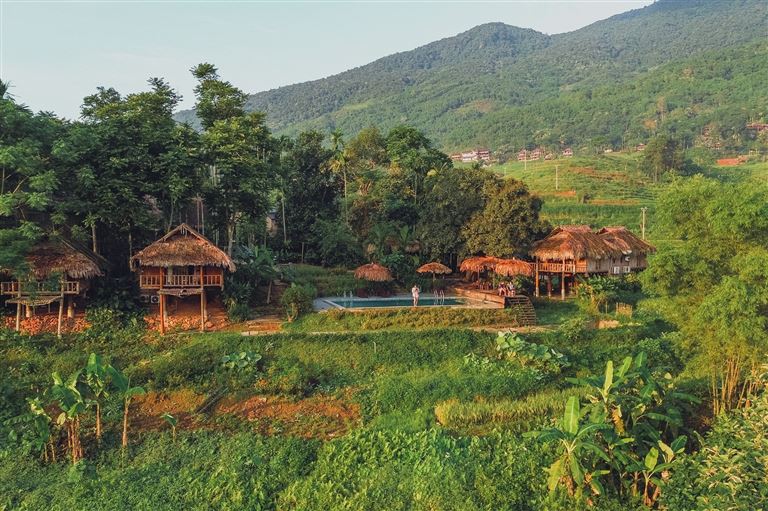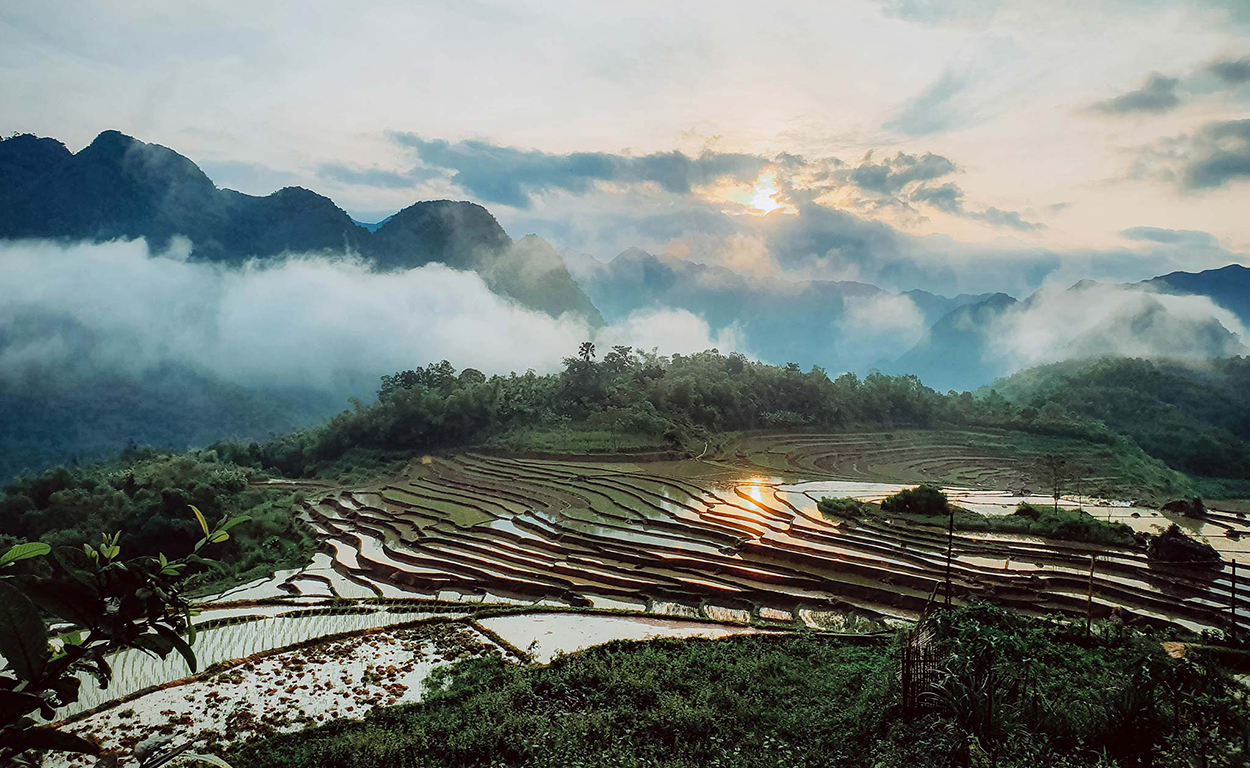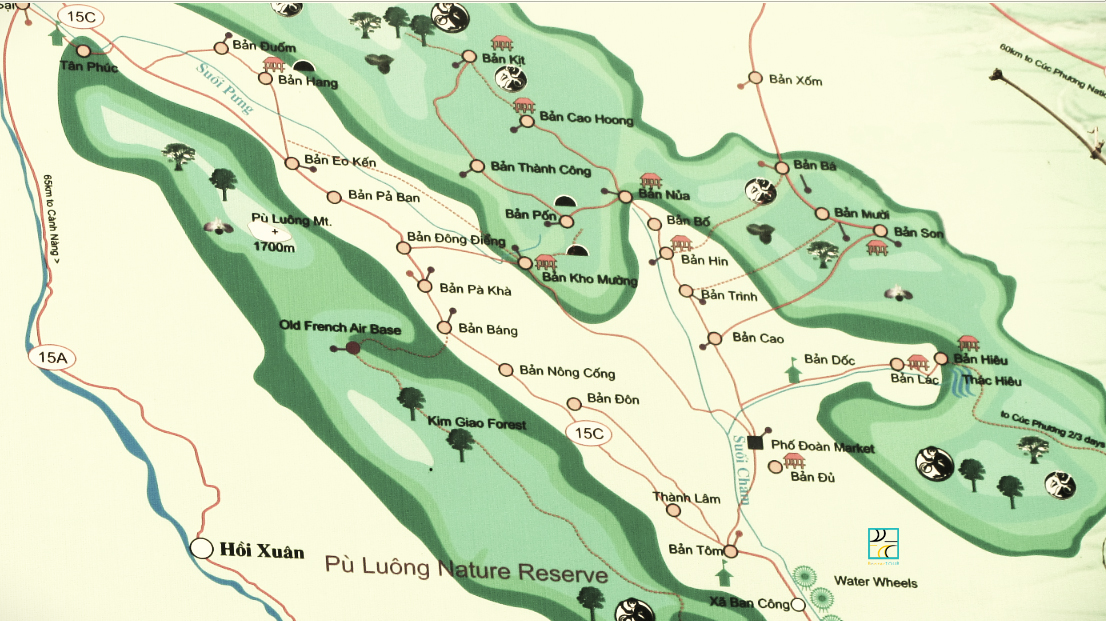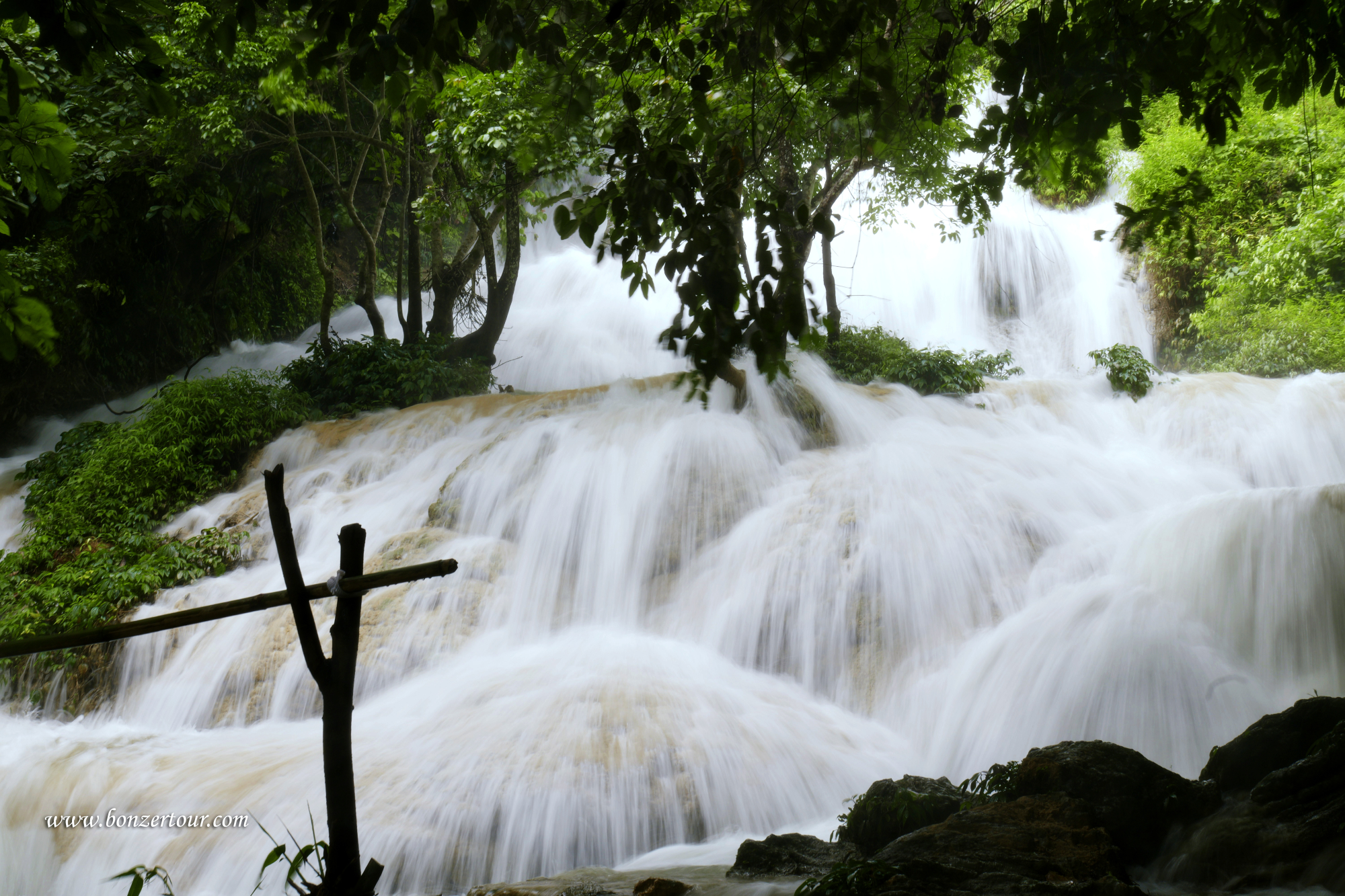Cập nhật: 01-01-1970 12:00:00 | Blogs about Vietnam | Lượt xem: 2037
Pu Luong has yet to appear on the mass tourism map of Northern Vietnam and for this reason, it’s a perfect place for anyone seeking tranquillity and peace. By spending a day or two in Pu Luong, you’ll be able to immerse yourself in nature, get some fresh breezes, and experience Vietnam’s ethnic culture to the fullest. In other words, it’s one of the few places in Vietnam where you can totally unplug and forget about the real world.
Pu Luong is a nature reserve located in Thanh Hoa Province, 160 km Southwest of Hanoi. Established in 1999 on an area of 17,662 ha, Pu Luong Nature Reserve Vietnam plays an important role in protecting the region’s biodiversity. It’s seen as an ecotourism site with remarkable values in science research and socio-economic development.
Featuring lush rice terraces, dense jungles, majestic limestone mountains and lovely ethnic villages, this nature reserve is a fantastic place for multi-day hiking or trekking. In fact, it’s one of the best trekking spots you can find in Vietnam.

Due to the similarities in landscape and culture, Pu Luong is often compared to its neighbor Mai Chau. However, this site is generally less touristy and more suitable for trekking. You can visit either Mai Chau or Pu Luong, or combine them in the same trip for the best experience.
Pu Luong’s climate is quite similar to Hanoi with four distinct seasons. It’s great to visit any time of the year, but the early autumn (September – October) is said to be the best choice. This is the harvest season when rice fields are tinged with gold, and the weather is cool and pleasant.
Another ideal time for a trip to Pu Luong is the early summer (May – June), when it has yet to get too hot. This is also time for the new crop in Pu Luong so the whole area will be covered in fresh air and a soothing green tone.
At this moment, there hasn’t been any direct bus from big cities to Pu Luong yet, and this is partly the reason why this land is so tranquil. Pu Luong is about 4 hours of driving from Hanoi and 3 hours from Thanh Hoa City. You can either rent a car/scooter and get there on your own, or book a door-to-door minibus service for about $8 – 12.
Several high-end hospitalities also provide round-trip shuttle transfers that will pick you up in Hanoi or Thanh Hoa’s Tho Xuan Airport.
Pu Luong offers all kinds of accommodations and you can easily find one that suits your needs. If you want to experience local life, the best choice for you is staying at a homestay in rural villages like Kho Muong, Kit or Hieu… Most of them are traditional stilt houses with dormitory beds, but it doesn’t mean you can’t find some private rooms. Prices for one night here range from $5 – 20.
There are also several luxury resorts in this area with room rates starting from $50. These facilities provide spacious rooms with nice views, infinity pools, pretty ornaments and basic utilities. However, as this is an eco-tourism site, you will hardly see modern devices like TVs or air conditioners…

Most homestays in Pu Luong lent you their bicycles for free, so why not take advantage of that? The roads in Pu Luong may be narrow, but decent enough to pedal through (except a few distant mountain roads). Along the way, you’ll come across hardworking villagers with bright smiles on their faces and find out how they make a living in the most real way possible.
Of course, cycling in the bucolic Pu Luong is also a great chance to soak in nature’s beauty. You’ll be able to see various terraced rice paddies juxtaposed with sharp mountains, hear the rural sound of birdsong and gurgling streams, and catch a glimpse of shiny water gullies shimmering under the sunlight. Delightful, isn’t it?
Dotted around Pu Luong Nature Reserve are the quaint villages of the Thai – the main ethnic group living in this area. This is one of the few ethnic minorities in Vietnam who still retains the custom of living in stilt houses. Aside from being extremely skillful at wet rice cultivation, they also master excellent weaving techniques.
The easiest way to tour these villages is on a mountain bike. Since tourism hasn’t affected local life in Pu Luong, visitors will be able to witness the most pristine and authentic here. You can either hide a local guide (most accommodations provide this service), or travel by yourself if your Vietnamese is fluent enough.
Wandering around the nature reserve, you’ll see countless bamboo water wheels clustering along the streams. These rustic yet magnificent wheels are a significant element that makes up Pu Luong’s appeal. They are not merely agricultural tools, but also a highlight of the ethnic Thai culture.
The Thai created these wheels to irrigate their terraced fields with water taken from lower-lying streams. As the wheel slowly spins under the influence of the flow, its pipes scoop up an amount of water and then pour it into a bamboo tube when they reach the top. This brilliant invention is extremely useful when the water level decreases in times of drought and low rainfall.

Trekking in Pu Luong is a fantastic experience. From breathtaking scenery and sloppy terrain to clean air and an idyllic atmosphere, this spot has everything you need for a perfect trek. You can organize a multi-day trek around the reserve, trek up any hilltop, or conquer the splendid Mt. Pu Luong.
Located in the West of Pu Luong Nature Reserve, Mt. Pu Luong is one of the highest peaks in this region at an altitude of 1,700 m. In the ethnic Thai’s language, the name “Pu Luong” itself also means “highest peak”. It will take at least 5 hours to reach the top of Mt. Pu Luong, but the striking view from high above is surely worth your efforts.

Among numerous cascading waterfalls in Pu Luong, Hieu Waterfall is the most famous with clear white water and multi-layered flows. Stretching 800 m in length, the waterfall splits into two smaller streams halfway before merging once again at the end. There’s also a large pool on its base where you can take a dip to cool down after hiking or trekking.
Hieu Waterfall can be uncovered after a short walk from Hieu Village. Besides swimming in the pool, you can also explore the palm hills and primeval forests nearby.
If you happen to be in Pu Luong on a Thursday or Sunday, don’t miss Pho Doan Market – a colorful fair that only takes place twice a week. At the market, ethnic villagers from surrounding areas gather to trade all kinds of stuff, from hand-made clothes to fresh food and household items. It’s an ideal spot to learn about ethnic culture and sample the tastiest local dishes.
Pho Doan Market is located on Doan Street in Lung Niem Commune. It starts at 6 am, and usually ends around 11 am. To reach this market, the sellers must carry their products through notable distances, from a few to a dozen km.
Traverse Pu Luong and Mai Chau
Mai Chau is only around 45 minute drive from Pu Luong. These two destinations make up a perfect combination for a pleasant journey to the mountainous regions in Vietnam. Trekking in Pu Luong and Mai Chau are moderate comparing to the higher mountain destinations in northern Vietnam such as Ha Giang and Sapa. The most common duration for a Mai Chau Pu Luong Trip is 3 days 2 nights. However, if your Vietnam travel itinerary is not so tight, it's highly recommend to spend more days staying at valley view homestay or ecolodge and explore more unique trekking route in Pu Luong, as well as Mai Chau.
The incredible Co Lung duck is a renowned specialty of the Thai people living in Hieu Village. As a pure breed of duck well cared for by the local community, the Co Lung duck has a long-lasting reputation for its amazing taste. This dish could be prepared in different recipes, but the most popular is roasted Co Lung duck. After marinating the duck with local spices, the cook stuffs it with mac mat (clausena indica) leaves before roasting the whole duck on charcoal. As a result, the duck will be covered in a characteristic reddish-brown shade and give off an irresistible smell.
Despite its tiny size, the stream goby in Pu Luong still offers a unique culinary experience. Villagers catch gobies fresh from the stream, then carefully clean and marinate them with forest spices and herbs. Afterward, they could be either grilled or deep-fried. Pu Luong’s stream goby is often served with la lot (piper sarmentosum) leaves and steamed sticky rice.
Smoked buffalo meat is a specialty that the Thai prepare for the traditional New Year, but you can still find it on other occasions. The secret of this snack lies in its seasonings, which are a combination of dried chili, ginger, salt, and the two most typical spices of Northern Vietnam – mac khen and hat doi. After being marinated for a few hours, the buffalo meat is hung up and smoked on charcoal until it’s dry on the outside while remaining soft inside. To enjoy thit trau gac bep, you only need to tear it into thin strips and dip it into chili sauce.
Oc nui da is a type of snail that only appears in small mountain caves, mostly during the rainy season. The simplest way to prepare it is by steaming. In Pu Luong, oc nui da is often served with a signature dipping sauce made from fish sauce, sugar, vinegar, lime leaves and lemongrass. The process of pulling the snail out of its shell is a little bit tricky, but you’ll be surprised by its sweetness and chewiness.
Banana blossom’s chunky and flaky texture makes it an interesting ingredient widely used in traditional Southeast Asian cooking. In Pu Luong and many other regions of Vietnam, banana blossom salad is a delicious side dish favored in not only daily meals but also big celebrations. The process of making this dish is quite simple. First, they pick fresh banana blossoms from any plantation around, then cut it into thin slices and soak them in salt water to retain the original colors. After being washed, the banana blossom slides are mixed with thinly sliced pig ears, herbs, roasted peanuts, and last but not least, a special sweet and sour sauce.

Essentials Tours - 10 days 9 nights

Culture - History - 13 days 12 nights

Active & Adventure - 10 days 9 nights















